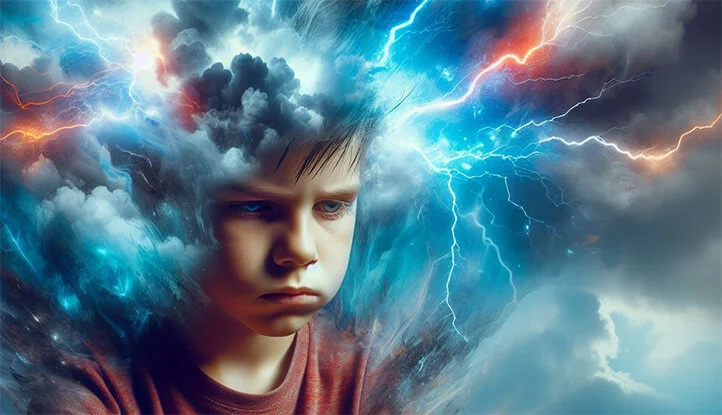Autism Spectrum Disorder (ASD) is a complex neurological disorder characterized by difficulties in social interaction, communication, and restricted, repetitive patterns of behavior, interests, and activities. ASD is referred to as a “spectrum” because the symptoms and their severity can vary greatly among individuals.
Schizoid Personality Disorder: The Hidden Symphony of Loneliness
Schizoid Personality Disorder (SzPD) is a relatively understudied but not uncommon mental condition, characterized by difficulties in interpersonal relationships and a tendency towards loneliness. A person with SzPD is often perceived as emotionally detached, introverted, and indifferent to social interactions. However, beneath this outward appearance lies a complex personality with unique thought patterns and perceptions […]
Survivor’s Guilt: The Psychological Drama of Modern Heroes
In critical moments, when we face traumatic events or life-threatening situations, the survival instinct takes over. However, for some people who have survived a tragedy, the struggle doesn’t end after the danger has passed. They may experience deep feelings of guilt, depression, and emotional difficulties, known as “survivor’s guilt.”
Antisocial personality disorder: signs, symptoms, treatment
Antisocial personality disorder is characterized by a persistent disregard and lack of respect for the rights and feelings of others. Individuals with this disorder often exhibit aggressive or manipulative behavior and may act irresponsibly, ignoring social norms, rules, and obligations.
Bipolar Disorder: Living in a Rhythm of Mood Extremes
Bipolar disorder is a chronic mental illness characterized by significant mood swings that can greatly exceed the usual emotional range between joy and sadness, shifting from manic or hypomanic states (elevated mood and maximum energy) to episodes of deep depression, accompanied by decreased motivation and a lack of interest in life.
Anhedonia: Tips for Restoring Full Perception of the World
Anhedonia is a condition where a person loses the ability to experience pleasure from activities or interests that previously brought them joy. This can affect various aspects of life, including interest in social interactions, hobbies, food, sex, and other activities. Anhedonia is often a symptom of various mental disorders, such as clinical depression, schizophrenia, bipolar […]
Clinical Depression: New Horizons in Understanding the Disease
Clinical depression is a serious mental illness characterized by persistent sadness, loss of interest in life, and a lack of pleasure in usual activities, which significantly affects a person’s daily life. It goes beyond normal mood fluctuations and short-term emotional reactions to current life challenges.
Narcissistic Personality Disorder: When Self-Love Goes Beyond the Boundary
Narcissistic personality disorder is a mental disorder characterized by prolonged and excessive self-admiration, a need for admiration and attention from others, and a lack of empathy. People with narcissistic personality disorder often display dismissive, arrogant behavior or attitudes, a preoccupation with fantasies of boundless success, power, brilliance, beauty, or ideal love.
Borderline Personality Disorder: Life on an Emotional Rollercoaster
Borderline Personality Disorder (BPD) is a complex mental illness characterized by significant emotional instability, problems with self-esteem, difficulties in interpersonal relationships, and frequent impulsive behavior. The main signs of this disorder include intense fears of rejection, difficulties managing anger, mood swings, feelings of emptiness, and instability in self-identity.
ADHD in Adults: Causes, Symptoms, and Treatment of Attention Deficit Hyperactivity Disorder
ADHD in adults is a neurological and behavioral disorder characterized by difficulties with attention, impulsivity, and, in some cases, hyperactivity. It is often diagnosed in childhood but can persist or be diagnosed in adulthood as well.
Treatment of Gambling Addiction: Dispelling Myths and Stereotypes
Gambling Addiction (ludomania, gambling dependency, or compulsive gambling disorder) is defined as an uncontrollable urge to gamble, which takes precedence over any other interests and daily activities. This condition is characterized by obsessive thoughts about gambling, increased time and money spent on gambling, and the continuation of gambling despite negative consequences.
Obsessive-Compulsive Disorder (OCD) and its Impact on Everyday Life
Obsessive-Compulsive Disorder (OCD) is a mental illness characterized by the presence of intrusive thoughts (obsessions) and compulsive actions (compulsions). Obsessions are repetitive and unwanted thoughts, images, or impulses that cause anxiety or distress. Compulsions are repetitive actions or rituals performed in an attempt to alleviate the anxiety caused by obsessions. These symptoms can significantly affect […]
Attention Deficit Hyperactivity Disorder (ADHD): Between Scientific Research and Real Life
Attention Deficit Hyperactivity Disorder (ADHD) is a neurodevelopmental disorder most commonly diagnosed in children and can persist into adulthood. It is characterized by three main symptoms: inattention, hyperactivity, and impulsivity.
Moderate Depression: Proven Ways to Restore Emotional Balance
Moderate Depression (or Moderate Clinical Depression) is a mental disorder that can limit an individual’s ability to function normally, work, and maintain healthy relationships. It is characterized by significant and persistent symptoms of depression that affect daily life but are not as severe as in cases of major depression.
Post-Traumatic Stress Disorder (PTSD): From Theoretical Overview to Practical Recommendations
Post-Traumatic Stress Disorder (PTSD) is a mental disorder that may occur after a person experiences or witnesses traumatic events, such as physical or sexual violence, disasters, military conflicts, etc. PTSD is characterized by a prolonged period of intense stress or anxiety following a traumatic experience.














